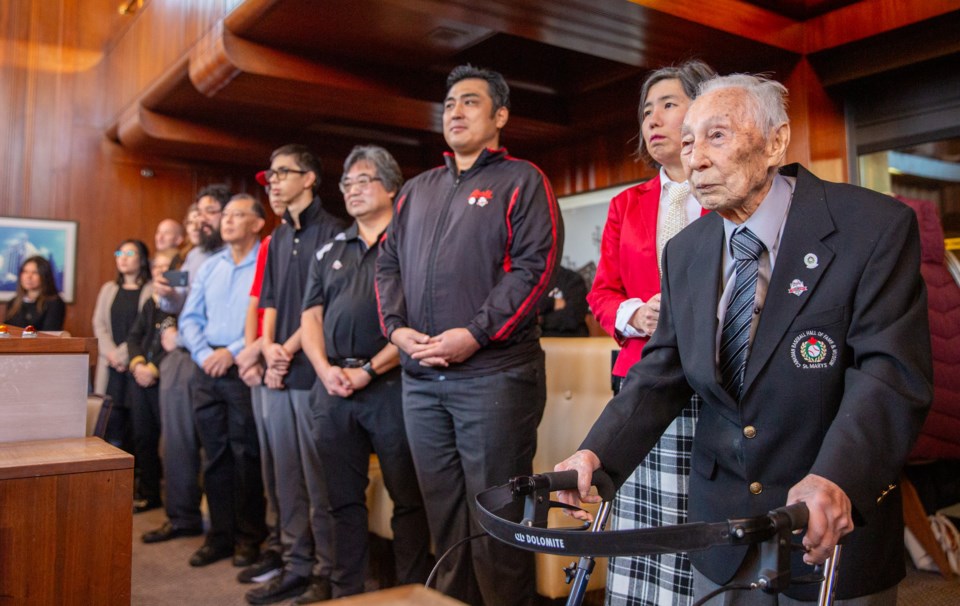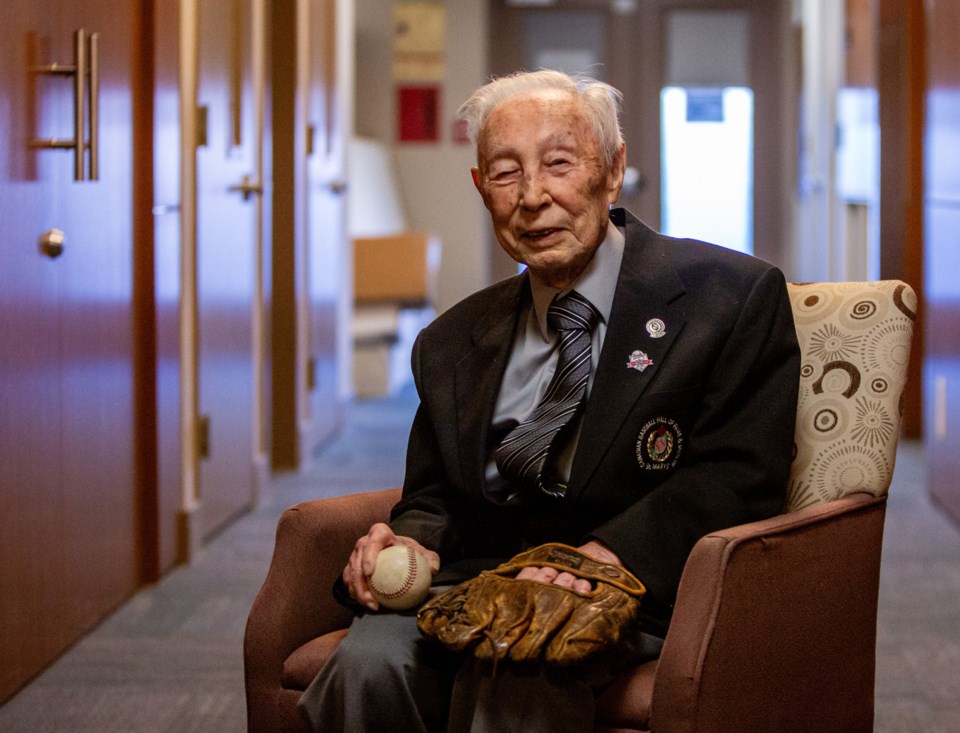Koichi Kaye Kaminishi had a big day Thursday.
First, he turned 102.
Second, he celebrated “Vancouver Asahi Day,” which Mayor Ken Sim proclaimed in honour of the legendary Asahi baseball team that played out of what is now Oppenheimer Park in the Downtown Eastside.
Kaminishi, who was once known by teammates as the “vacuum cleaner” for his ability to scoop up baseballs, is the last living member of the Asahis, a team recognized in the Canadian Baseball Hall of Fame and B.C. Sports Hall of Fame.
“This is too much for me,” he said before the ceremony, adding that he was never a star player. “I don’t know what to say. I’m not a high-class person. I’m just an ordinary person.”
Even though the proclamation was officially about Kaminishi’s former team, the event also doubled as a birthday party for a man who attributed his longevity to keeping fit by playing sports.
“I played baseball in the summer and in wintertime I played quite a bit of badminton, so maybe that’s the reason I’m still here,” said Kaminishi, who was born Jan. 11, 1922 in the family-run rooming house at 143 Dunlevy Ave., where he could see the baseball field from his window.
In the same neighbourhood, he played lacrosse, roller hockey and table tennis. But baseball was his passion and at 17, he was selected to the Asahis. He recalled not sleeping the first night he received his uniform.
He played third base, or “the hot pocket” as he described the position.
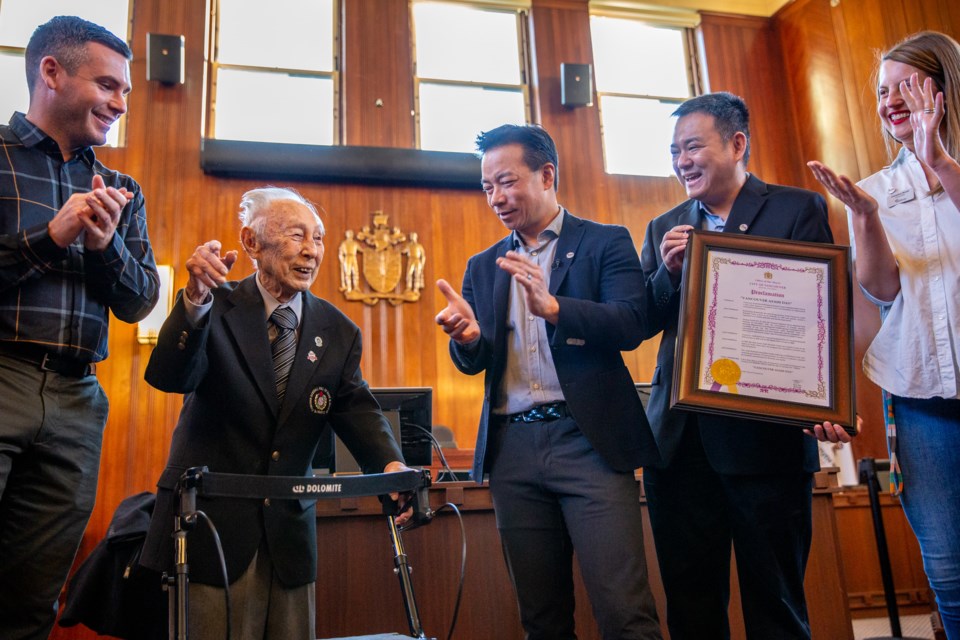
'Noble character'
The spry centenarian, smartly dressed in a Canadian Baseball Hall of Fame blazer and grey slacks, was joined at city hall by his children Joyce and Ed, grandson, friends, young baseball players, Japanese-Canadian community leaders and Japan’s Consul General Kohei Maruyama, who all sang Happy Birthday to him.
“Ever since I met him, I have held deep respect for his athletic lively demeanour and his noble character,” Maruyama said in a speech in the council chamber, adding that Kaminishi has served as inspiration to a younger generation of baseball players.
Grandson Kenny Shimokura said it was nice to see the Asahis recognized, noting the pride his grandfather and teammates had in representing the Japanese community at a time of segregation.
“As a kid, he grew up always admiring the Asahi, and dreaming about playing on the team,” Shimokura said. “So for him to be able to realize that dream and then become the last surviving member of the team that he and the community loved so much, it’s pretty special to see.”
Shimokura’s mother, Joyce, said her father’s teammates and those who played with the Asahis before him would have appreciated the proclamation; the team’s roots date back to 1914 and players came and went for another couple of decades after inception.
“It’s a proud day for all the Asahi family,” she said, before answering why her father’s love for baseball continues in his 102nd year.
“I ask him, ‘Which would do you prefer to watch on TV — baseball or hockey?’ Baseball, he says. So I guess it's the good memories for him, his youth, the accomplishments and making so many people happy.”
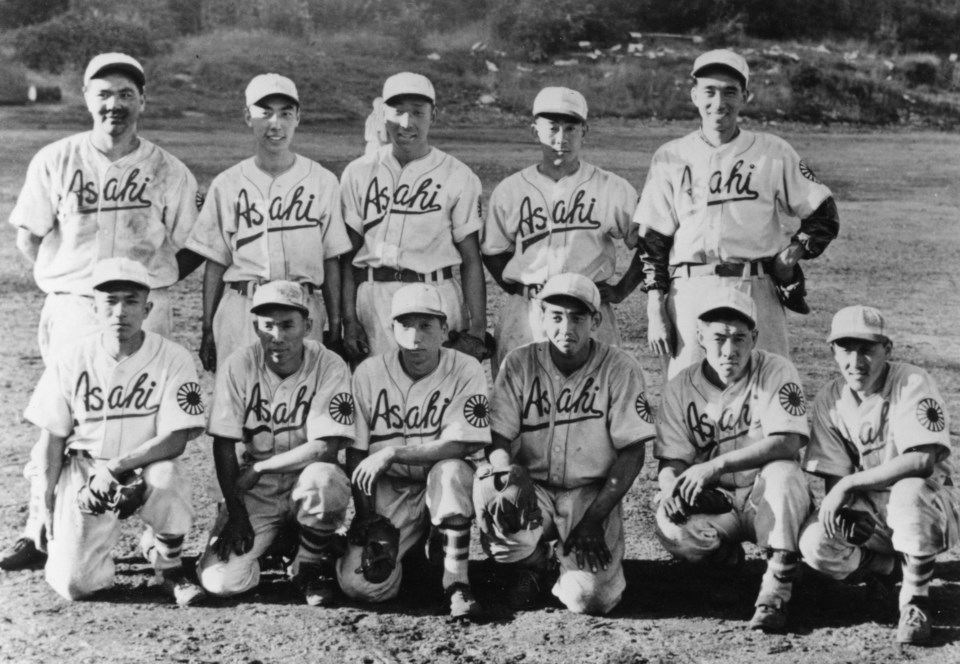
Internment camps
Kaminishi only played for the Asahis for three years — not because he wasn’t good enough to continue, but because Japanese forces attacked Pearl Harbor on Dec. 7, 1941, sending the world into another full-out war.
The proclamation given to Kaminishi described what came next for Japanese people.
“The Government of Canada unjustly detained, dispossessed and dispersed 22,000 Japanese-Canadians for the remainder of the war. The Vancouver Asahi baseball team was disbanded, and Kaye Kaminishi and his teammates were either sent to internment camps, east of the Rockies, or exiled to Japan.”
The government considered all Japanese people in the country "enemy aliens," no matter if they were born in Canada or immigrated from Japan.
Property and businesses were seized, with Kaminishi and his mother ending up in a camp in East Lillooet; his father, who died when Kaminishi was a boy, lost the family’s Royston Lumber Co. on Vancouver Island.
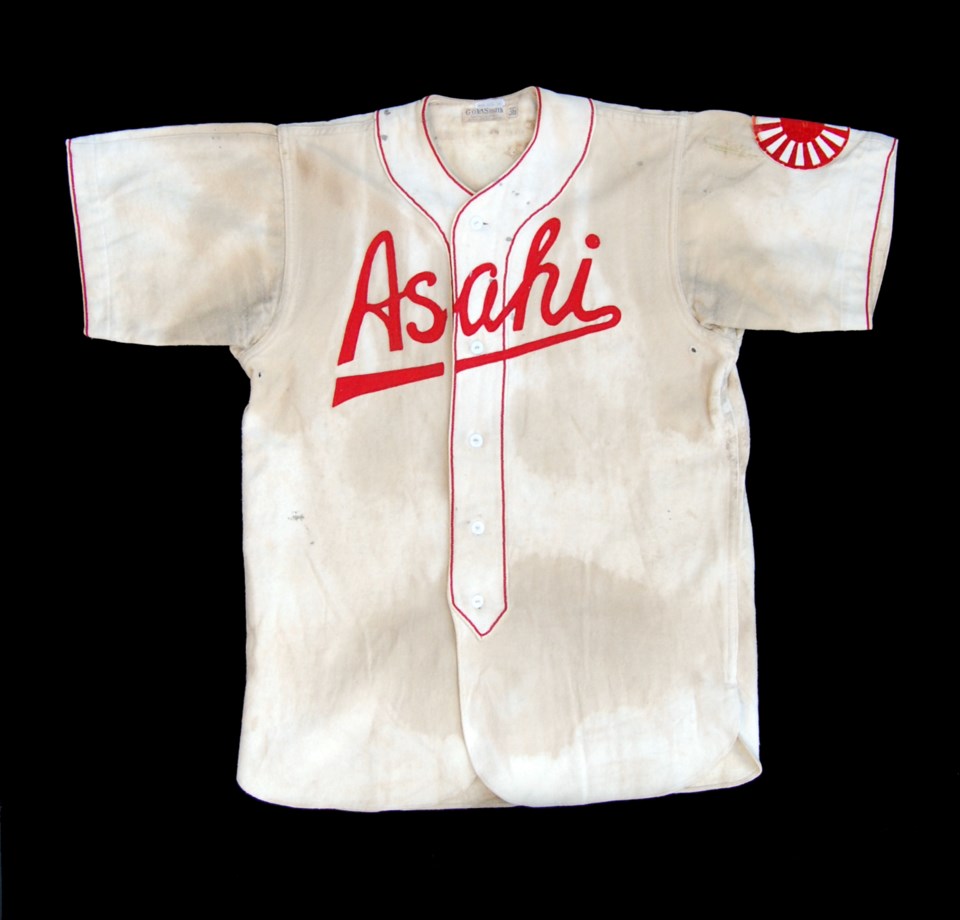
'Can't keep us down forever'
While in the camp, Kaminishi continued to play baseball with other residents, eventually organizing a game with townspeople living on the other side of a bridge. Other camps also formed teams, which led to a tournament in Slocan in 1943.
Some of the players were former Asahi members and wore their uniforms during the games, instilling that pride for players and camp residents that was lost when the team played its last game in 1941.
Former Asahi member Kiyoshi Suga recalled in a documentary produced by Jari Osborne that the quality of the baseball wasn’t of the Asahi calibre, but it didn’t matter.
“We took such great pleasure out of playing ball again,” Suga said in Sleeping Tigers: The Asahi Baseball Story. “It had a feeling — let’s show them…let’s show them that they can’t keep us down, they can’t keep us down forever.”
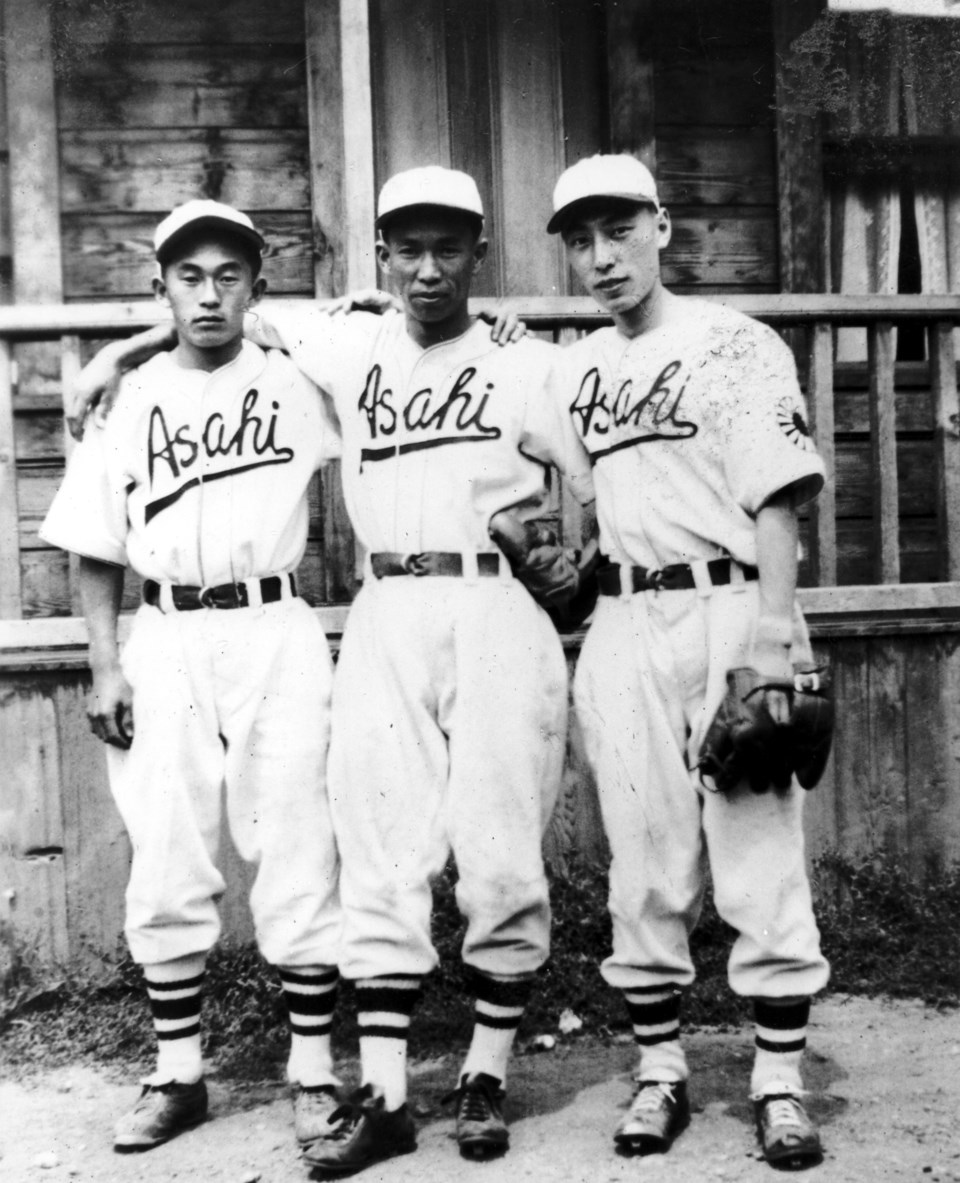
'Brain ball'
In the years leading up to the attack on Pearl Harbor, the Asahi — employing a “brain ball” strategy to their style of play which focused on bunting and stealing bases — were said to be an unstoppable force, winning championship after championship.
Osborne’s documentary reported that the team’s popularity not only grew among the Japanese community, but attracted fans from across the city. A newspaper report said the Asahis were the most popular team in Vancouver
“They were heroes — great heroes,” Frank Moritsugu, a columnist for Nikkei Voice, said in the documentary.
After the Second World War ended, with no inheritance and the family businesses gone, Kaminishi moved to Kamloops, where he found jobs packing tomatoes, before working for BC Hydro and as a clerk at a government liquor store.
He eventually operated a motel, all the while continuing to play baseball and other sports. He continues to reside in Kamloops, although he does spend part of the year at his daughter's house in Burnaby.
Kaminishi was married for 66 years to Florence before she died at 92 in April 2017.
'Very proud Canadian'
To this day, his grandson said, Kaminishi has never complained about his life and how things might have turned out differently for him and the family.
“That’s always been something that I've admired — for everything that happened to him and everything that he faced, he never complained about it once,” he said. “He’s always been a very, very proud Canadian and considers Canada his home country.”
Though the Asahi team Kaminishi remembers is long gone, its legacy has been recognized in a stamp and in a Canadian Heritage Minute. The spirit of Asahi baseball also lives on.
A team continues to operate in Metro Vancouver, where players up to 16 years old play in tournaments in Japan, the United States and in Kamloops, where Kaminishi is always a welcome guest, according to John Wong, president of the Asahi Baseball Association.
“The main purpose of the club is really to keep the legacy of Asahi alive,” said Wong, who was at city hall Thursday. “And today just recognizes the need to keep the history going with the younger generation and hopefully carry that on for centuries to come.”
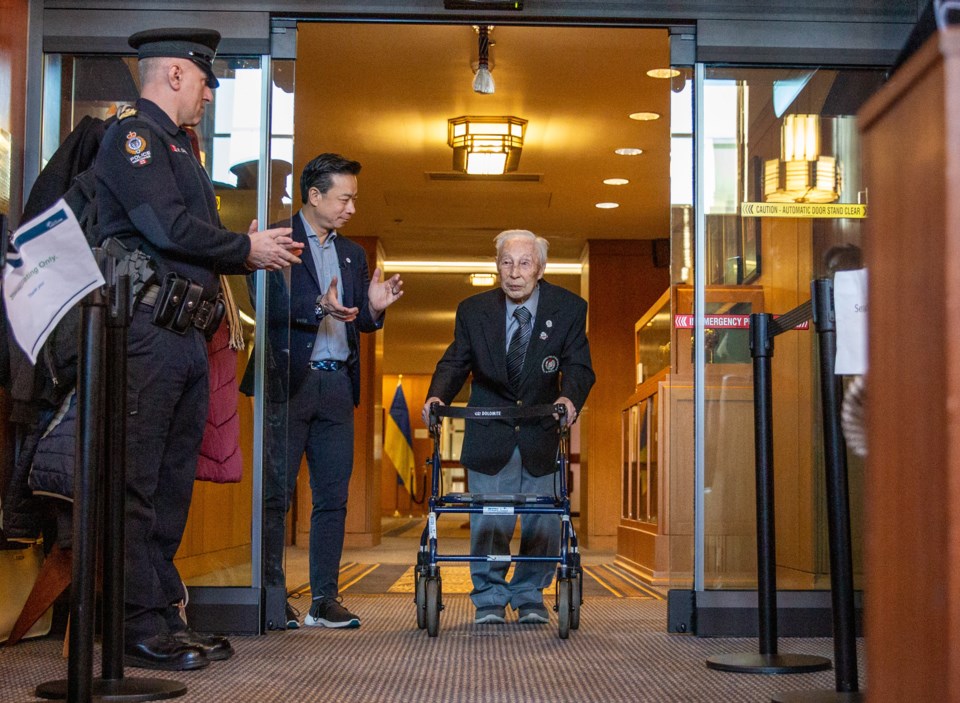
'All of this was unexpected'
Kaminishi, meanwhile, was given a birthday cake from the mayor’s office and his daughter suggested they might stop at Denny’s Restaurant on the way home because breakfast is free on a person’s birthday.
Before he left city hall though, he answered more questions from reporters, posed for photographs and reflected on the gathering, as he stood with the mayor in the lobby outside the council chamber.
“I’m feeling pretty good,” he said. “All of this was unexpected.”
